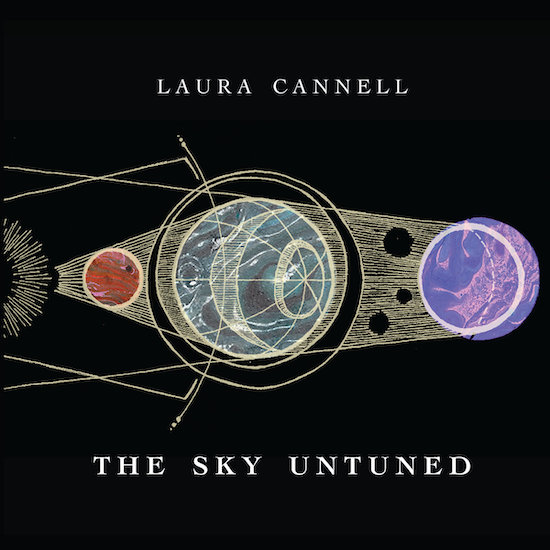In a short space of time, innovative fiddle player Laura Cannell has built up a highly original, and impressive body of work. Her previous albums – Feather Swing of the Raven, Quick Sparrows Over the Black Earth, Beneath Swooping Talons, Simultaneous Flight Movement, Hunter Huntress Hawker and Reckoning – have all been drawn from the landscape of her East Anglian home territory, which she explores through the highly unusual medium of her improvised, overbowed violin. She makes the strings sound as though they are in constant dialogue with one another, and with the place where they are recorded.
The Sky Untuned is, like much of her work, recorded live in a carefully chosen location, in this case St. Andrew’s Church in the Norfolk Broads village of Raveningham. However, it is a more diverse collection of pieces, inspired by the places she has visited during 18 months of touring and the performers she has worked with. They range beyond the flat lands of the east to channel other landscapes, ideas and influences into a cascade of musical responses.
The unifying concept is a cosmic one, that of the music of the spheres. The Elizabethans believed in a system of concentric spheres, surrounding the Earth and rotating invisibly to produce celestial music. It is easy to believe that Cannell has discovered the key to this mythical music, with the rich tones of her violin broadcasting sounds of unearthly clarity. Some are drawn from the earth, as before. The improvised, spring-like double melodies of ‘Flaxen Fields’, inspired by the “sea-like crops” of arable Suffolk, are played on a scordatura violin, literally ‘mistuned’ with its middle strings switched. The more martial figures in ‘Flaming Torches’ belong to the Iceni army, marching across East England led by Queen Boudicca. Elsewhere, the setting is very different. On ‘Untethered’, the brittle clarity of the Norwegian air is clearly reflected in a piece derived from a performance in Bergen. On ‘Landmark’ Cannell plays with the two-tone notes of the foghorn, based on a social history of the foghorn that formed part of the ‘Modern Ritual’ tour.
Cannell also records some of the music that most resembles her style, with both a very early piece by the French polyphonic composer Pérotin from the late 12th century, and a tune based a work by the Bohemian baroque composer HIF Biber. Her playing sounds both current, and deeply tied to a long musical history with a minimalist simplicity that reflects the essence of Baroque and the organic tones of early instruments.
The Sky Untuned is a fascinating and involving album, communicating with an unflinching directness that is sometimes almost raw, and often very beautiful. Cannell’s performance is powerfully linked to her writing, and the listener can hear her creating and developing her ideas as she plays. It is entirely logical that she should have written these pieces on the road as new places and sounds infiltrated her music. It is equally logical that she should have returned home to Norfolk to play them, bringing her changed experience back to enlighten her understanding of the countryside that inspired her in the first place. Her continuing creativity shines through, and she continues to deliver outstandingly fresh and essential recordings that speak to us from a thousand years ago.


